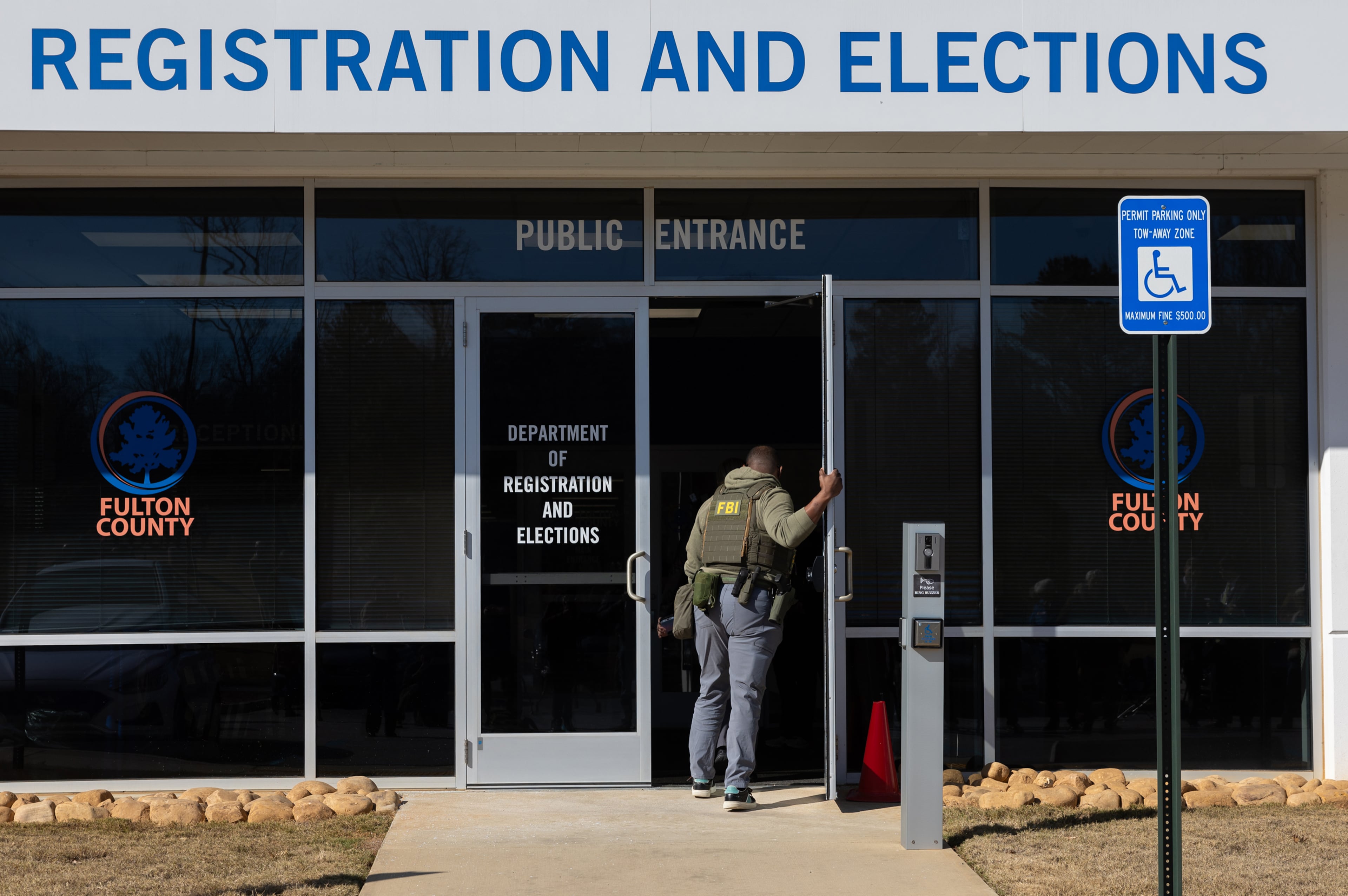Mystery of missing votes deepens as Congress investigates Georgia
To find a clue about what might have gone wrong with Georgia’s election last fall, look no further than voting machine No. 3 at the Winterville Train Depot outside Athens.
On machine No. 3, Republicans won every race. On each of the other six machines in that precinct, Democrats won every race.
The odds of an anomaly that large are less than 1 in 1 million, according to a statistician’s analysis in court documents. The strange results would disappear if votes for Democratic and Republican candidates were flipped on machine No. 3.
It just so happens that this occurred in Republican Brian Kemp’s home precinct, where he initially had a problem voting when his yellow voter access card didn’t work because a poll worker forgot to activate it. At the time, Kemp was secretary of state — Georgia’s top election official — and running for governor in a tight contest with Democrat Stacey Abrams.
The suspicious results in Winterville are evidence in the ongoing mystery of whether errors with voting machines contributed to a stark drop-off in votes recorded in the race for Georgia lieutenant governor between Republican Geoff Duncan, who ended up winning, and Democrat Sarah Riggs Amico.
Even though it was the second race on the ballot, fewer votes were counted for lieutenant governor than for labor commissioner, insurance commissioner and every other statewide contest lower on the ballot. Roughly 80,000 fewer votes were counted for lieutenant governor than in other down-ballot elections.

The potential voting irregularities were included among 15,500 pages of documents obtained by The Atlanta Journal-Constitution that have also been turned over to the U.S. House Oversight and Reform Committee, which is looking into Georgia's elections. The documents, provided under the Georgia Open Records Act, offer details of alleged voting irregularities but no answers.
Secretary of State Brad Raffensperger's office has refused to open an investigation. State election officials say the low number of votes could have been caused by low interest in the lieutenant governor's race or where that contest appeared on the ballot.
The Georgia Supreme Court is also considering a challenge to the lieutenant governor's race. Duncan won by 123,000 votes, but the plaintiffs contend missing votes could have changed the result.
The unresolved questions about the election have contributed to mistrust in the state’s electronic voting system and questions about election officials’ commitment to investigating complaints in a thorough and nonpartisan manner.
State election officials say they have looked into the lieutenant governor’s race but found no indication of problems with election equipment or vote counts.
A sharp decline
There were 159,000 fewer votes in the lieutenant governor’s race than the 3.9 million votes cast for the governor’s race, a 4% drop-off rate. Other statewide races had about 2% fewer votes than the governor’s race. It’s not unusual for voters to skip down-ballot races, but normally there’s a steady decline rather than an exceptional drop in the second-most-prominent contest.
"Voters deserve to know what happened," said Amico, who is not involved in the court challenge and announced Tuesday that she's running for the U.S. Senate. "There was insufficient action taken to secure the most foundational and basic element of our government: the right to vote. They don't want to look."
The decline in votes showed up on ballots cast on the state’s electronic voting machines in 101 of Georgia’s 159 counties. On paper absentee ballots, there wasn’t a significant decline in votes cast for lieutenant governor.
In addition, the drop-off in votes grew more extreme in precincts with large African American populations, according to an analysis by TargetSmart, a data-tracking firm affiliated with the Democratic Party.

“Was this completely voter behavior and confusion, or was there something in the machine software or hardware to cause this to happen?” asked Chris Brill, a senior data analyst for TargetSmart. “I’ve never seen a drop-off pattern like this, ever.”
Georgia's 17-year-old electronic voting system is already riddled with potential vulnerabilities to hacking, tampering and malfunctions, according to plaintiffs in a federal lawsuit who want voters to use hand-marked paper ballots. In a ruling this month, U.S. District Judge Amy Totenberg called the voting system "unsecure, unreliable and grossly outdated."
The state’s electronic machines lack a paper ballot that could be used to double-check the accuracy of digital results.
Election officials purchased a $107 million voting system this month that will add computer-printed paper ballots to the voting process. The new system, which is scheduled for statewide use in the March 24 presidential primary, combines touchscreens with printers that create a ballot that voters can review before inserting into scanners for tabulation.
On Election Day last year, the Secretary of State’s Office conducted testing that mirrored the circumstances of the actual election, said Ryan Germany, the general counsel for the office. People cast randomized, videotaped mock votes in the office throughout the day. The results and video verified that votes exactly matched those recorded by the voting machines.
Voters may have skipped the lieutenant governor’s race because it appeared on the same screen as the governor’s race, unlike in most years when there’s also a U.S. Senate race alongside the governor’s race, he said.
“I think some people thought they were voting as a ticket for governor and lieutenant governor, which happens in some states. It doesn’t happen in Georgia,” Germany said. “Some bug (in voting machines) from our perspective would have had to appear in the checks that we did.”
Unanswered questions
Still, satisfying explanations are hard to come by.
Why would voters skip the lieutenant governor’s race on electronic voting machines but not on paper absentee ballots? Why would African American voters be disproportionately affected? If votes disappeared, could they have changed the results of the lieutenant governor’s race?
So far, state officials haven’t dug more deeply to find out.
Robyn Crittenden, who filled in as secretary of state for a few weeks after Kemp’s election as governor, declined Amico’s request for a recount because she didn’t identify any specific errors in the elections process. Crittenden wrote in a Nov. 17 letter that it’s not unusual for voters to skip races, and voters aren’t obligated to vote in every contest.
A judge in January dismissed a case contesting Duncan's election, saying the plaintiffs didn't prove specific problems with the recording of ballots that would alter the outcome of the contest. That's the case now pending with the Georgia Supreme Court.
"There is a real wall up and real obstacles to prevent sunshine from coming in and having any kind of election transparency," said Marilyn Marks, the executive director for the Coalition for Good Governance, an election security group that filed the lawsuit. "Let's find some facts. It's crazy to think that the paper-ballot voters felt one way about the candidates and the machine voters felt another way."
Coding for voting machines could have been incorrect on touchscreens, so that votes for the lieutenant governor’s race showed up in another contest, she said. The race could have been missing from some electronic ballots. Or there could have been other malfunctions or programming errors.
In the Winterville precinct where one machine showed aberrant results, the elections director said she wasn’t aware of the issue, but it didn’t raise a concern to her.
“I’ve never heard of a flipped vote under direct-recording electronic machines,” said Charlotte Sosebee, the elections director for Athens-Clarke County. “As for one candidate or one party getting more votes than another on the machines, that’s not something that we track or is considered a red flag.”
County election officials ensure that the number of voters matches the number of ballots cast, Sosebee said. They also conduct logic and accuracy testing to ensure voting machines work correctly. They don’t look for out-of-the-ordinary results.
"The most plausible explanation (in the Winterville case) is that misconfiguration caused votes for Republican candidates to be recorded as votes for Democratic candidates, and vice-versa," according to a paper published last month by Kellie Ottoboni and Philip Stark of the University of California, Berkeley, Department of Statistics.
The racial disparity in the undervote rate is harder to explain. Electronic voting machines have been marketed as a way to help people of different education and disabilities vote correctly, but the higher undervote rates for African American voters suggests that electronic voting harms historically disadvantaged groups, according to the findings of Ottoboni and Stark.
Without more information, it’s difficult to determine what could have gone wrong in the lieutenant governor’s race.
Critics of Georgia’s voting machines fear the possibility of hacking, but it’s unclear why a hack would target the relatively low-profile lieutenant governor’s race rather than the heated race for governor, which Kemp won by nearly 55,000 votes, a margin of 1.4 percentage points. There were no reported allegations of erroneous results in the governor’s race.
Another possibility is that there was a computer error at some point in the election process, said Eddie Perez of the Open Source Election Technology Institute, which recommends hand-marked paper ballots.
Election officials should check whether each race was coded correctly so that votes on touchscreens were correctly recorded on electronic ballots, he said. They should also look into the election programming process to ensure some races weren’t left off some machines.
“I don’t know why the state of Georgia appears to be resisting an examination,” Perez said. “They’re not getting any closer to the truth. This really is unusual, and it begs explanation.”
Vote disparity in lieutenant governor’s race
Race … Vote decline compared to governor
Lieutenant governor … -4%
Secretary of state … -1.4%
Attorney general … -2%
Agriculture commissioner … -2.4%
Insurance commissioner … -2%
State school superintendent … -2%
Labor commissioner … -2.3%
Source: Georgia Secretary of State’s Office


